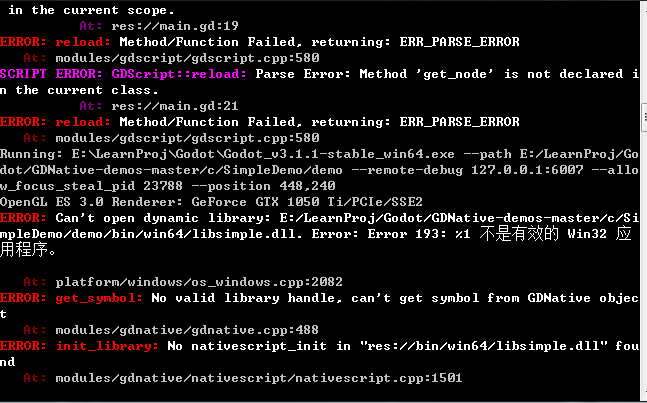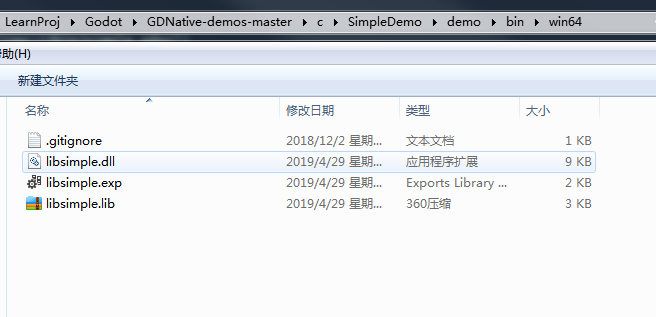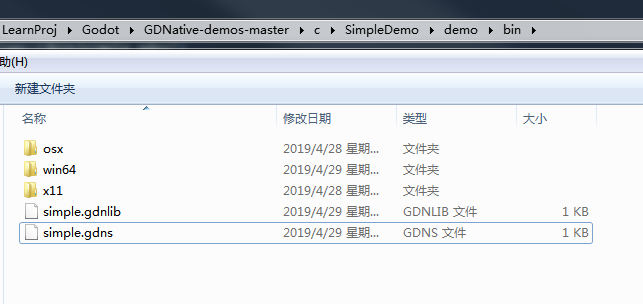This repository contains C headers for Godot Engine's GDNative API, which can be used to write NativeScripts.
GDNativeenables the use of dynamically linked libraries inside of Godot.
NativeScriptuses GDNative to implement scripts backed by native code.
This repositories follows the same branch versioning as the main Godot Engine repository:
mastertracks the current development branch. As this is a moving target, the headers in this repository may not always be fully in sync with upstream. See Updating Headers if you need to bring them up to date.3.xtracks the development of the next 3.x minor release. Likemaster, it might not always be fully up-to-date with upstream.- Other versioned branches (e.g.
3.3,3.2) track the latest stable release in the corresponding branch.
Stable releases are also tagged on this repository: Tags.
For any project built against a stable release of Godot, we recommend using this repository as a Git submodule, checking out the specific tag matching your Godot version.
| Build latest version of Godot | GitHub | Docs |
|---|
Clone godot-headers under SimpleLibrary/
cd SimpleLibrary
git clone https://github.com/godotengine/godot-headersNote that the master branch of this repository contains the headers for the
latest Godot master branch. See Versioning for details.
You can use -b <version> to the above Git clone command to retrieve a specific
branch or tag (e.g. -b 3.x or -b godot-3.3.3-stable).
[SimpleLibrary]
├── lib/
└── src/Create test.c under SimpleLibrary/src/.
#include <gdnative/gdnative.h>
#include <nativescript/godot_nativescript.h>
#include <stdio.h>
void *test_constructor(godot_object *obj, void *method_data) {
printf("test.constructor()\n");
return 0;
}
void test_destructor(godot_object *obj, void *method_data, void *user_data) {
printf("test.destructor()\n");
}
/** func _ready() **/
godot_variant test_ready(godot_object *obj, void *method_data, void *user_data, int num_args, godot_variant **args) {
godot_variant ret;
godot_variant_new_nil(&ret);
printf("_ready()\n");
return ret;
}
/** Library entry point **/
void GDN_EXPORT godot_gdnative_init(godot_gdnative_init_options *o) {
}
/** Library de-initialization **/
void GDN_EXPORT godot_gdnative_terminate(godot_gdnative_terminate_options *o) {
}
/** Script entry (Registering all the classes and stuff) **/
void GDN_EXPORT godot_nativescript_init(void *desc) {
printf("nativescript init\n");
godot_instance_create_func create_func = {
.create_func = &test_constructor,
.method_data = 0,
.free_func = 0
};
godot_instance_destroy_func destroy_func = {
.destroy_func = &test_destructor,
.method_data = 0,
.free_func = 0
};
godot_nativescript_register_class(desc, "SimpleClass", "Node", create_func, destroy_func);
{
godot_instance_method method = {
.method = &test_ready,
.method_data = 0,
.free_func = 0
};
godot_method_attributes attr = {
.rpc_type = GODOT_METHOD_RPC_MODE_DISABLED
};
godot_nativescript_register_method(desc, "SimpleClass", "_ready", attr, method);
}
}
godot_variant GDN_EXPORT some_test_procedure(void *data, godot_array *args) {
godot_variant ret;
godot_variant_new_int(&ret, 42);
godot_string s;
godot_string_new_with_wide_string(&s, L"Hello World", 11);
godot_print(&s);
godot_string_destroy(&s);
return ret;
}Expand Details for example code.
On Linux:
clang -g -fPIC -c src/test.c -I/path/to/godot/headers/ -o src/test.os
clang -g -shared src/test.os -o lib/test.soOn MacOS:
clang -g -fPIC -c src/test.c -I/path/to/godot/headers/ -o src/test.os
clang -g -shared -framework Cocoa -Wl,-undefined,dynamic_lookup src/test.os -o lib/test.dylib-gis for debugging information.- Use
godot_nativescript_*methods only in thenativescript_init()function.
The GDNativeLibrary resource contains links to the libraries for each platform.
- Create a new resource in memory and edit it.
- Select
Resource > GDNativeLibrary. - Set the library file for your platform inside the inspector.
- Save the edited resource as a
.tres
Expand Details for screenshots.
extends Node
func _ready():
var gdn = GDNative.new()
gdn.library = load("res://lib/libtest.tres")
gdn.initialize()
var res = gdn.call_native("standard_varcall", "some_test_procedure", [])
print("result: ", res)
gdn.terminate()- Attach a new script to a node.
- In the pop-up dialog, choose NativeScript in the
Languagemenu. - Enable built-in script, or create a
.gdnfile, which only contains a name. - Specify the
Class Name. - Press
Create.
The GDNativeLibrary field in a NativeScript is empty by default.
Expand Details for screenshots.
What is the difference between GDNative and NativeScript?
GDNative is a new class that can call native functions in libraries.
GDScript / VisualScript / C#, etc, are able to use this class.
Godot treats NativeScript as a scripting language, enabling the
use of GDNative to implement scripts backed by native code.
Which languages are binding as a NativeScript?
Can you debug NativeScripts?
You must compile the library with debug symbols, and then you can use your debugger as usual.
Can you use one GDNativeLibrary for all NativeScripts?
You can! ✨
What is the reason behind the name "GDNative"?
GDNative was originally named "cscript" because it exposes a C API, but people mistook a relation to C#, which is sometimes abbreviated as "cs". Then named "DLScript", but that brought up some confusion, so we settled with GDNative. 📖
See Versioning for details on the Godot versions tracked by each branch of this repository.
If the relevant branch is not up-to-date for your needs, or if you want to sync the headers with your own modified version of Godot, here is the update procedure used to sync this repository with upstream releases:
- Compile Godot Engine at the specific version/commit which you are using.
- Use the compiled executable to generate the
api.jsonfile with:godot --gdnative-generate-json-api api.json - Copy the file
modules/gdnative/gdnative_api.jsonto this repository. - Copy the files and folders from
modules/gdnative/includeto this repository, overwriting existing content. (To be sure to be in sync, you can delete the folders of this repository first, then copy the upstream folders in place.) Make sure that you compiled the correct Godot version so that the generatedgdnative_api_struct.gen.his up-to-date.









